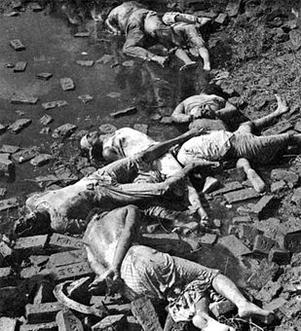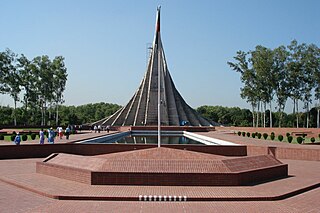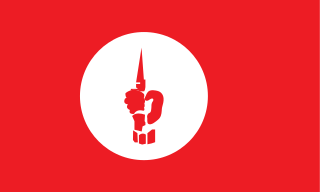Related Research Articles

Sheikh Mujibur Rahman, also known by the honorific Bangabandhu, was a Bangladeshi politician, revolutionary, statesman, activist and diarist, who was the founding president of Bangladesh. As one of the founding leaders of Bangladesh, he had held continuous positions, Initially he served as the president of the Awami League, later as the president of Bangladesh, and then as the prime minister of Bangladesh until his assassination in August 1975. His nationalist ideology, socio-political theories, and political doctrines are collectively known as Mujibism.

The Indo-Pakistani war of 1971, also known as the third India-Pakistan war, was a military confrontation between India and Pakistan that occurred during the Bangladesh Liberation War in East Pakistan from 3 December 1971 until the Pakistani capitulation in Dhaka on 16 December 1971. The war began with Pakistan's Operation Chengiz Khan, consisting of preemptive aerial strikes on eight Indian air stations. The strikes led to India declaring war on Pakistan, marking their entry into the war for East Pakistan's independence, on the side of Bengali nationalist forces. India's entry expanded the existing conflict with Indian and Pakistani forces engaging on both the eastern and western fronts. Thirteen days after the war started, India achieved a clear upper hand, and the Eastern Command of the Pakistan military signed the instrument of surrender on 16 December 1971 in Dhaka, marking the formation of East Pakistan as the new nation of Bangladesh. Approximately 93,000 Pakistani servicemen were taken prisoner by the Indian Army, which included 79,676 to 81,000 uniformed personnel of the Pakistan Armed Forces, including some Bengali soldiers who had remained loyal to Pakistan. The remaining 10,324 to 12,500 prisoners were civilians, either family members of the military personnel or collaborators (Razakars).
A Quaker Action Group (AQAG) was founded in Philadelphia during the summer of 1966 to "apply nonviolent direct action as a witness against the war in Vietnam".

The Bangladesh Liberation War, also known as the Bangladesh War of Independence and known as the Liberation War in Bangladesh, was an armed conflict sparked by the rise of the Bengali nationalist and self-determination movement in East Pakistan, which resulted in the independence of Bangladesh. The war began when the Pakistani military junta based in West Pakistan—under the orders of Yahya Khan—launched Operation Searchlight against East Pakistanis on the night of 25 March 1971, initiating the Bangladesh genocide.
Mohammad Zahirullah, known as Zahir Raihan, was a Bangladeshi novelist, writer and filmmaker. He is most notable for his documentary Stop Genocide (1971), made during the Bangladesh Liberation War. He was posthumously awarded Ekushey Padak in 1977 and Independence Day Award in 1992 by the Government of Bangladesh.

The Bangladesh genocide was the ethnic cleansing of Bengalis, especially Bengali Hindus, residing in East Pakistan during the Bangladesh Liberation War, perpetrated by the Pakistan Army and the Razakars. It began on 25 March 1971, as Operation Searchlight was launched by West Pakistan to militarily subdue the Bengali population of East Pakistan; the Bengalis comprised the demographic majority and had been calling for independence from the Pakistani state. Seeking to curtail the Bengali self-determination movement, erstwhile Pakistani president Yahya Khan approved a large-scale military deployment, and in the nine-month-long conflict that ensued, Pakistani soldiers and local pro-Pakistan militias killed between 300,000 and 3,000,000 Bengalis and raped between 200,000 and 400,000 Bengali women in a systematic campaign of mass murder and genocidal sexual violence. In their investigation of the genocide, the Geneva-based International Commission of Jurists concluded that Pakistan's campaign involved the attempt to exterminate or forcibly remove a significant portion of the country's Hindu populace. West Pakistanis in particular were shown by the news that the operation was carried out because of the 'rebellion by the East Pakistanis' and many activities at the time were hidden from them, including rape and ethnic cleansing of East Pakistanis by the Pakistani military.
Stranded Pakistanis in Bangladesh are Urdu-speaking Muslim migrants with homelands in present-day India who settled in East Pakistan following the partition of India in 1947.
The Razakar were a gendarmerie and paramilitary force in East Pakistan organised by General Tikka Khan in 1971. They were organised as a counter-insurgency force to fight Mukti Bahini guerrillas in the Bangladesh Liberation War, and played an infamous role in the Bangladesh genocide. The Razakars were disbanded following Pakistan's defeat and surrender in the 1971 Indo-Pakistani War.
East Bengali Refugees are people who left East Bengal following the Partition of Bengal, which was part of the Independence of India and Pakistan in 1947. An overwhelming majority of these refugees and immigrants were Bengali Hindus. During the Bangladesh liberation war with West Pakistan, an estimated ten million people of East Pakistan fled the country and took refuge in India particularly in the Indian states of West Bengal and Indian North East region, especially Tripura and Assam.

War Resisters' International (WRI), headquartered in London, is an international anti-war organisation with members and affiliates in over 40 countries.
East Pakistan Central Peace Committee was one of several committees formed in East Pakistan in 1971 to aid efforts of Pakistani forces during the Bangladesh War of Independence. Nurul Amin, as a leader of Pakistan Democratic Party, led the formation of the Shanti Committee to thwart the Mukti Bahini, which fought for the independence of the region.

There have been numerous works of art created as a result of the Bangladesh Liberation War. In 1971, a concert was organized by members of the British rock band, The Beatles, in support of Bangladesh. The songs recorded for and broadcast on Swadhin Bangla Betar Kendra are still considered to be the best of Bangladeshi protest songs.
Kader Bahini was an independent militia created during the Bangladesh War of Independence of 1971, the other being Mukti Bahini. It was named after its leader, Kader Siddique.

The 7th March Speech of Bangabandhu, or the 7/3 Speech, was a public speech given by Sheikh Mujibur Rahman, the founding leader of Bangladesh on 7 March 1971 at the Ramna Race Course in Dhaka to a gathering of over one million (1,000,000) people. It was delivered during a period of escalating tensions between East Pakistan and the powerful political and military establishment of West Pakistan. In the speech, Bangabandhu informally declared the independence of Bangladesh, proclaiming: "The struggle this time, is a struggle for our liberty. The struggle this time, is a struggle for our independence." He announced a civil disobedience movement in the province, calling for "every house to turn into a fortress".
The Indo-Pakistani Naval War of 1971 refers to the maritime military engagements between the Indian Navy and the Pakistan Navy during the Indo-Pakistani War of 1971. The series of naval operations began with the Indian Navy's exertion of pressure on Pakistan from the Indian Ocean, while the Indian Army and Indian Air Force moved in to choke Pakistani forces operating in East Pakistan on land. Indian naval operations comprised naval interdiction, air defence, ground support, and logistics missions.

The Mukti Bahini, also known as the Bangladesh Forces, was a big tent armed guerrilla resistance movement consisting of the Bangladeshi military personnel, paramilitary personnel and civilians during the Bangladesh Liberation War that transformed East Pakistan into Bangladesh in 1971. They were initially called the Mukti Fauj.
Bangladeshis in India are members of the Bangladesh diaspora who currently reside in India. The mass migration into India since Bangladesh independence has led to the creation of anti-foreigner movements, instances of mass violence and political tension between Bangladesh and India, but it has also created measurable economic benefits for both nations.

The Pakistani prisoners of war in the Indo-Pakistani war of 1971 were the servicemen deployed in the Eastern Command of the Pakistan armed forces who were held in by the Indian Army.

Muktijuddho e-Archive, also known as Bangladesh Liberation War e-Archive, is a 'Library, Archive & Research' organization, founded in 2007, working with collection, preservation & distribution of historical documents & research on the Liberation War of Bangladesh and Genocide of Innocent Bengali People in 1971. It was previously known as 'Bangladesh Liberation War Library & Research Centre', later in March 2016, it was registered under existing Trust Law of Bangladesh as 'Muktijuddho e-Archive Trust'. On 14 November 2016, it was officially inaugurated.

Bangladesh Film Development Corporation (BFDC) is a government owned and operated corporation in Tejgaon, Dhaka, Bangladesh. Nuzhat Yeasmin is the managing director of the corporation.